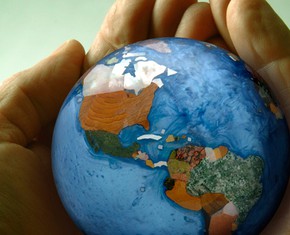The views expressed in our content reflect individual perspectives and do not represent the authoritative views of the Baha'i Faith.
Recently, the Pentagon released three videos of Unidentified Flying Objects. Is there life on other planets—and do they have souls, too?
Since the 1950s, the U.S. government has looked into reports of unidentified aerial phenomena, while NASA searched for conditions that could allow life beyond Earth. Astrophysicists cautiously claim that, despite what it looks like, these UFOs may be caused by atmospheric effects, reflections, or bugs in the imaging and display codes of fighter jets. But the recently-released Navy videos have us all wondering: is there extraterrestrial life out there?
Ever since I was a child, I wondered if there is life on other planets. At school, I learned that our universe is infinite, and that there are planets and stars that haven’t even been discovered yet. In a universe so vast and spacious, I thought, there must be life outside of our own small world. These ideas grew stronger as more movies, TV shows, and books focused on life outside of Earth, and these videos—and the public’s reaction to them—prove that I’m not the only one.
I found a basis for my belief in the existence of extraterrestrial life in the holy writings of the Baha’i Faith. Baha’is believe that God’s creations extend throughout the universe He created. Therefore, one could interpret that life forms are not exclusive to Earth. Baha’u’llah, the prophet and founder of the Baha’i Faith, wrote: “Know thou that every fixed star hath its own planets, and every planet its own creatures, whose number no man can compute.”
But if every solar system has its own planets, and every planet has its own type of creatures, how would we recognize them? These creatures may not be human-like—they could be microscopic bacteria, plants, or the green-looking organisms so often portrayed in Hollywood.
The universe is an infinite source of mystery and unanswered questions, and so much of it has yet to be explored. If one day we do find life on other planets, I wonder how alike these creatures would be to us. Coming from different planets millions of light-years away, how could they not be drastically different from us?
But regardless of the type of life that exists outside of the realm of Earth, I find it interesting that Baha’u’llah also describes humans like this: “…Man, the noblest and most perfect of all created things.”
This implies that even if we find life on other planets, no other organisms will be as intellectually or spiritually advanced as humans. Baha’u’llah also says that God “chose to confer upon man the unique distinction and capacity to know Him and to love Him—a capacity that must needs be regarded as… the primary purpose underlying the whole of creation. Upon the reality of man, however, He hath focused the radiance of all of His names and attributes, and made it a mirror of His own Self. Alone of all created things man hath been singled out for so great a favor, so enduring a bounty.”
From this quote, I infer that God gave humans all of His attributes. He singled out humanity and, due to His love, gave us the capacity to know and to love Him. This generous bestowal of divine virtues brings us to another question: if humans have all the attributes of God, can there be a creature that is more spiritually empowered than a human being?
Either way, this should not make us think of ourselves as superior. One of the core principles of the Baha’i Faith is the oneness of humanity. This unity surpasses barriers of race, religion and nationality—wouldn’t it also make sense for it to surpass planetary barriers?
The Baha’i writings affirm: “This limitless universe is like the human body, all the members of which are connected and linked with one another with the greatest strength… The parts of this infinite universe have their members and elements connected with one another, and influence one another spiritually and materially.” No matter how different we are from any other creatures, we are still connected to them, and we are responsible for their wellbeing.
The human race constantly advances, and our natural curiosity and determination will propel us forward and further than we have ever gone before. It seems as if we are bound to find some type of life, as modern science has just begun to develop the ability to discover other planets within our solar system. For example, we now have telescopes that can reach other galaxies!
But as we continue our explorations of the universe, we must remember that just as we strive to achieve unity on Earth, we should be determined to establish peace with any potential extraterrestrial neighbors. As long as our approach is infused with understanding, compassion, and other divine virtues at its core, we will be ready for whatever we find.
You May Also Like
Comments

















‘Abdu’l-Bahá
Some Answered Questions (p.235)